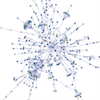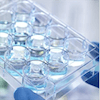Quantitative Proteomics Service
Proteomics is a large-scale study of proteins in a certain organism. Depending on specific research objective, there are many analytical techniques for proteomics study. To better meet our clients' needs, MtoZ Biolabs is proud to offer 5 quantitative proteomics service, including Label-free, iTRAQ/TMT, SILAC, MRM, and SWATH. We also provide custom proteomics service for specific project. You are welcome to contact us for more detailed information on project design and sample requirements.
Service Category

MtoZ Biolabs provides label-free proteomics service, featured by label-free property and scalable application for analyzing multiple samples at once.

MtoZ Biolabs offers an all-inclusive iTRAQ/TMT proteomics service package, including in vitro isobaric labeling and LC-MS/MS analysis. This service is suitable for relative quantification analysis of up to 10 samples.

MtoZ Biolabs offers a complete set of SILAC/Dimethyl quantitative proteomics service, including in vivo metabolic labeling and LC-MS/MS analysis. This service is suitable for comparison of 2-3 samples.

MtoZ Biolabs provides Sequential Window Acquisition of all Theoretical fragment ions (SWATH), featured by data independent acquisition with high-throughput quality and sensitivity comparable to that of MRM technique.

MtoZ Biolabs provides absolute targeted proteomics service, Multiple Reaction Monitoring (MRM) with the highest sensitivity and accuracy so far to meet various needs in high-quality quantitative proteomics study.
MtoZ Biolabs, an integrated chromatography and mass spectrometry (MS) services provider.
Related Services
Label Free Quantification Proteomics Service
Label-Based Protein Quantitative Service—iTRAQ, TMT, SILAC
TMT Quantitative Proteomics Analysis Service
Protein Sequencing
Protein Full-Length Sequencing
Protein Analysis
PTM Analysis
How to order?







